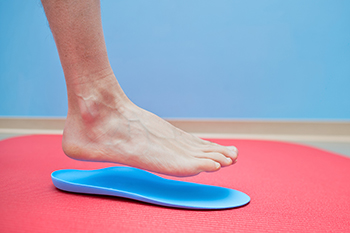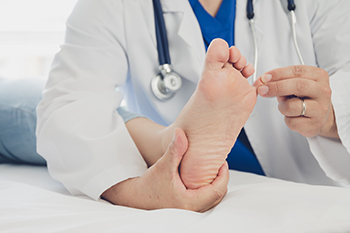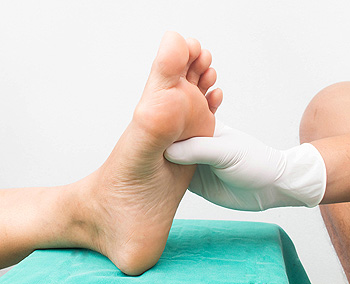

Many people choose to wear orthotics that can help to protect and realign the structure of the feet. Having plantar fasciitis, flat feet, and heel spurs are common conditions that may be helped by wearing custom-made orthotics. There are various types of insoles, consisting of every day and running. Insoles that are worn daily may last up to six months, and this can depend on how many hours they are worn. People who are athletes may be interested in learning about running insoles, which may last between three and four months. Patients who stand on their feet during the workday may benefit from wearing insoles in their work boots, and this can be successful in providing the necessary support while working. If you would like additional information about the types of orthotics that can be purchased, it is strongly suggested that you consult with a podiatrist who can guide you toward the type of orthotics that are best for you.
If you are having discomfort in your feet and would like to try orthotics, contact Dr. Harris L. Klear from Burlington County Podiatry Associates. Our doctor can provide the care you need to keep you pain-free and on your feet.
What Are Orthotics?
Orthotics are inserts you can place into your shoes to help with a variety of foot problems such as flat feet or foot pain. Orthotics provide relief and comfort for minor foot and heel pain but can’t correct serious biomechanical problems in your feet.
Over-the-Counter Inserts
Orthotics come in a wide variety of over-the-counter inserts that are used to treat foot pain, heel pain, and minor problems. For example, arch supports can be inserted into your shoes to help correct overarched or flat feet, while gel insoles are often used because they provide comfort and relief from foot and heel pain by alleviating pressure.
Prescription Orthotics
If over-the-counter inserts don’t work for you or if you have a more severe foot concern, it is possible to have your podiatrist prescribe custom orthotics. These high-quality inserts are designed to treat problems such as abnormal motion, plantar fasciitis, and severe forms of heel pain. They can even be used to help patients suffering from diabetes by treating foot ulcers and painful calluses and are usually molded to your feet individually, which allows them to provide full support and comfort.
If you are experiencing minor to severe foot or heel pain, it’s recommended to speak with your podiatrist about the possibilities of using orthotics. A podiatrist can determine which type of orthotic is right for you and allow you to take the first steps towards being pain-free.
If you have any questions please contact one of our offices located in Marlton and Delran, NJ . We offer the newest diagnostic and treatment technologies for all your foot and ankle needs.

Many people who have foot pain often hope to find relief and seek medical advice from a podiatrist. These are physicians who specialize in treating disorders of the feet and ankles and can provide a diagnosis for existing foot pain. The mandatory education to become a podiatrist begins with obtaining a bachelor's degree, followed by enrolling in a podiatry medical school. This will take four years to complete, and a Doctor of Podiatric Medicine, or DPM, degree will be earned. During the last two years, some of the topics that are covered can include biomechanics, sports medicine, and podiatric pathology. Once the medical school is completed, a residency program can begin and can last between 24 and 36 months. Podiatrists have options such as practicing in a private or group practice or a hospital setting, or may choose sports podiatry. If you are interested in pursuing a career in podiatry, it is suggested that you speak with this type of doctor who can answer any questions you may have.
If you are dealing with pain in your feet and ankles, you may want to seek help from a podiatrist. Feel free to contact Dr. Harris L. Klear from Burlington County Podiatry Associates. Our doctor can provide the care you need to keep you pain-free and on your feet.
What Is a Podiatrist?
A podiatrist is a doctor of podiatric medicine who diagnoses and treats conditions of the foot, ankle, and related structures of the leg. Your podiatrist may specialize in a certain field such as sports medicine, wound care, pediatrics, and diabetic care. Podiatrists have the ability to become board certified through training, clinical experience, and then taking an exam.
What Do Podiatrists Do?
On a daily basis, a podiatrist may perform the following activities:
It is very important that you take care of your feet. It’s easy to take having healthy feet for granted, however foot problems tend to be among the most common health conditions. Podiatrists can help diagnose and treat a variety of feet related conditions, so it is crucial that you visit one if you need assistance.
If you have any questions please feel free to contact one of our offices located in Marlton and Delran, NJ . We offer the newest diagnostic and treatment technologies for all your foot and ankle needs.

People who are 65 years old or older have increased chances of incurring a fall. A common reason this can happen may be a result of decreasing body strength as aging happens. A good fall prevention technique can include implementing a gentle exercise routine that can increase cardiovascular and muscle strength. Falling can have serious consequences, and may affect the feet. A broken ankle or toe may cause pain and difficulty in completing daily activities. Research has shown there are several thousand seniors who live independently, and many falls can occur in the home. Fall prevention strategies can include removing worn rugs from the living area, and it is helpful to improve lighting in the main areas of the household. Many people choose to have grab bars installed in the shower and toilet area, and it is beneficial to use a non-slip bath mat. If you would like to have additional knowledge about effective fall prevention techniques, it is suggested that you consult with a podiatrist who can help you with methods that can protect the feet.
Preventing falls among the elderly is very important. If you are older and have fallen or fear that you are prone to falling, consult with Dr. Harris L. Klear from Burlington County Podiatry Associates. Our doctor will assess your condition and provide you with quality advice and care.
Every 11 seconds, an elderly American is being treated in an emergency room for a fall related injury. Falls are the leading cause of head and hip injuries for those 65 and older. Due to decreases in strength, balance, senses, and lack of awareness, elderly persons are very susceptible to falling. Thankfully, there are a number of things older persons can do to prevent falls.
How to Prevent Falls
Some effective methods that older persons can do to prevent falls include:
Falling can be a traumatic and embarrassing experience for elderly persons; this can make them less willing to leave the house, and less willing to talk to someone about their fears of falling. Doing such things, however, will increase the likelihood of tripping or losing one’s balance. Knowing the causes of falling and how to prevent them is the best way to mitigate the risk of serious injury.
If you have any questions, please feel free to contact one of our offices located in Marlton and Delran, NJ . We offer the newest diagnostic and treatment technologies for all your foot care needs.

The majority of diabetic patients understand the importance of maintaining good foot care. Neuropathy is a common condition that can develop in people who have diabetes, and it is defined as the inability to feel existing cuts or wounds that have developed on the feet. Having elevated amounts of glucose levels in the blood may lead to poor circulation and nerve damage, possibly causing severe pain and foot ulcers to develop. Proper foot care begins daily with washing and drying the feet, followed by inspecting the soles with a mirror. This is an effective way to notice if any cuts have developed, and a family member or caregiver may help to accomplish this. It is beneficial to have toenails trimmed weekly, which may be helpful in preventing an ingrown toenail from developing. The feet need as much protection as possible, and this can be done by wearing comfortable shoes, in addition to refraining from walking barefoot. If you have diabetes, it is strongly suggested that you are under the care of a podiatrist who can help you to manage this condition and offer additional prevention techniques for maximum foot protection.
Diabetic foot care is important in preventing foot ailments such as ulcers. If you are suffering from diabetes or have any other concerns about your feet, contact Dr. Harris L. Klear from Burlington County Podiatry Associates. Our doctor can provide the care you need to keep you pain-free and on your feet.
Diabetic Foot Care
Diabetes affects millions of people every year. The condition can damage blood vessels in many parts of the body, especially the feet. Because of this, taking care of your feet is essential if you have diabetes, and having a podiatrist help monitor your foot health is highly recommended.
The Importance of Caring for Your Feet
Patients with diabetes should have their doctor monitor their blood levels, as blood sugar levels play such a huge role in diabetic care. Monitoring these levels on a regular basis is highly advised.
It is always best to inform your healthcare professional of any concerns you may have regarding your feet, especially for diabetic patients. Early treatment and routine foot examinations are keys to maintaining proper health, especially because severe complications can arise if proper treatment is not applied.
If you have any questions please feel free to contact one of our offices located in Marlton and Delran, NJ . We offer the newest diagnostic and treatment technologies for all your foot and ankle needs.